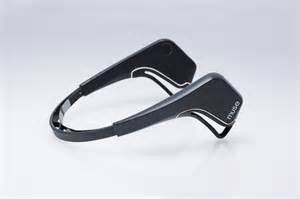THE MUSE, MINDFULNESS WEARABLES
 What about a headpiece to help you to train your brain? As mindfulness continues to gain acceptance as an integral part of a healthy lifestyle, it too has become lucrative fodder for inventors and investors who see its potential amidst the big business wellness industry.
What about a headpiece to help you to train your brain? As mindfulness continues to gain acceptance as an integral part of a healthy lifestyle, it too has become lucrative fodder for inventors and investors who see its potential amidst the big business wellness industry.
Like the Fitbit wristband that measures your movements towards the goal of physical fitness, the latest gadget to help you meditate and improve your focus is called the Muse. At a price tag of about $299, this headband uses electroencephalography sensors to measure the activity of your neurons to detect when your mind is focused and when it’s not.
The piece sits behind your ears with a thin plastic band with the sensors stretching across your forehead. With headphones on, the app begins to measure your brain activity as it coaches you through exercises to help you focus. For instance, as you begin the app prompts you to think about musical instruments or well-known celebrities. It then asks you to bring your attention to your breath. Counting your breath as sounds of nature play in the background; the sounds themselves can signify that your mind is starting to drift away from your point of attention.
A session last several minutes and produce for you a line graph that details brain activity in percentages of active, neutral, and calm states. You earn points (little bird icons) for the times you were calm.
The Muse creatively uses the latest in neuroscience to effectively engage the firing of neurons in our brain. This is good! It is fun. We all like fun. Another real positive is that this latest cool shiny object may actually be the catalyst to entice you to sit down and experiment with meditating. Its carrot approach that provides “rewards” for when you reach some moments of calm focus may keep you coming back and practicing. If you continue to work with it and see some noticeable benefits, (initial reviewers who are new to meditation have found it helpful), you may become interested in sitting and meditating without it or learning more.
In other words, it could lead to fully experiencing and working with mindfulness and its ability to transform, inspire and engender compassion.
Conversely, the nature of novelties is that they tend to peak quickly in popularity and fall from favor in the same fashion (most of my friends that ran out and bought a Fitbit are no longer wearing them or even know where they put them)! It will be interesting to follow up with Muse wearers in a year and see if they are still wearing them daily. 
The marketplace eagerly responds to our perennial search for the magic bullet, the quick and easy fix. AND as anyone who practices mindfulness will tell you, instant gratification leaves you grasping for more and more in order to satisfy.
What neuroscientists have also discovered is that when you stop, the brain returns to its wandering mind. It’s our default mode network. Just as our muscles atrophy when we stop lifting weights or exercising, our brain shrinks when not being work and trained.
To learn to be become focused, present, and calm is a process and a daily discipline, just as eating healthfully and getting physical exercise is a lifelong journey. Time and effort are required to build consistent concentration and equanimity.
If you understand that the Muse or any similar device, can be useful if employed as part of a larger program, and you can afford it, give it a try. 
I would love to hear from you 365 days from date of purchase.

